Dom Testa's Blog, page 5
April 10, 2020
Corona Cops
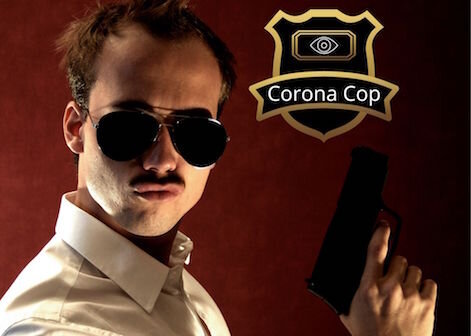
Ever heard the term citizen’s arrest?
That’s how ordinary citizens, in the absence of police officials, can step in to detain an individual believed to have committed a crime.
I’ve heard about it my entire life, but I’ve never seen an actual citizen’s arrest take place.
That’s not to say I haven’t witnessed a lot of finger pointing, accusations, and attempted shaming.
In fact, with the collective worldwide emphasis on isolation and quarantines, the Corona Cops are out in full force. And they are ferocious.
A friend of mine on social media posted a photo of her children and their friends at a birthday party. Immediately the Corona Cops lashed out in the comments section:
“How DARE you get together at a time like this!”
“Shame on you!”
“Worst parent of the year.”
Wait. My friend’s party had actually taken place four months earlier; she just got around to posting the picture now.
The Corona Cops, satisfied for the moment, retreated from their keyboards.
But not for long. My wife mentioned buying something from Home Depot, and was quickly shredded by comments like:
“Well, you’re obviously TOO GOOD to isolate.”
“Not keeping up with the news too well, are you?”
“Is that worth dying for?”

Uh, my wife had ordered it online and it was left on our doorstep. For the moment the angry hoards fell back into silence.
Look, most of us are doing our best to tamp down the spread of this deadly infection. And I know we’d like for everyone to do their best, too.
But in the history of humankind no populace has ever had 100% of its citizens play by the rules. There will always be asshats among us.
So is it too much to ask that people put away their Corona Cop badges, or at least not be so quick to whip them out? The constant screaming at others is just tiresome.
We’re grateful that you’re a responsible human being. We are. But nobody appointed you the COVID Czar, and no, you cannot speak to the manager of COVID behavior. So stop it, Karen.
Frankly, the rest of us are tired of walking on eggshells with every photo we post and every important errand we must run.
We are not criminals; we’re simply trying to get by in a ridiculously insane time.
In other words, a citizen’s arrest is not required at this time.
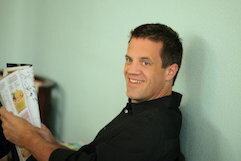
Dom Testa is a broadcaster and author.
His series of spy thrillers,
the Eric Swan series
, is available in print, ebook, and audiobook at your favorite retailer.
Angry animal courtesy of
Jason Hafso
on
Unsplash
April 5, 2020
Back to Normal
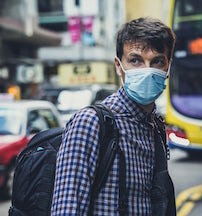
Without a doubt this has been the oddest year. In the aftermath of previous tragedies (terror attacks, mindless acts of violence, natural disasters) we at least could leave our houses.
We’d go to work, take in a movie or a concert, visit bars and restaurants. We may have been sobered by current events, but we weren’t prisoners in our home. We mingled. Socializing allowed us to either talk through what was happening, or provided a welcome distraction.
Now? As one of my friends posted recently, “It’s like I’m 16 again: Gas is cheap and I’m grounded.”
But after a few weeks of isolation we’ve reached the stage where people are beginning to wonder aloud, “When will things go back to normal?”
A more intriguing question is: Can things go back to normal?
It’s a subjective term; your normal may look quite different from mine. But, for the sake of argument, let’s accept that it’s how we went about our daily lives on, say, February 3rd.
Most of us went to work the day after a thrilling Super Bowl. We went about our business and we had stories to share of parties, football, and friends.
Six weeks later there are no parties, no sports of any kind - other than stale replays on ESPN - and our friends have all become virtual.
Today, when we do slip out of our homes, we go about essential activities in a stealthy manner. We hardly make eye contact in grocery stores, and we can’t help but wonder if every stranger passing in the aisle carries the scourge.
Yeah, it’s always been possible to catch an illness from other people. For millennia we’ve passed around cold and flu viruses. But those felt more like an annoyance than a potential life-threatening exchange.
This is different. And we are becoming different.
If we’re being honest, I’d say our innocence is forever lost. Regardless of whether or not a vaccine is introduced this year, won’t we continue to feel leery? Bugs mutate, and who’s to say another scare in 2023 or 2026 won’t be even worse?
Here are some things I wonder about:

Moving forward, how enthusiastic will you be about shaking hands? Has that custom been rendered obsolete?
Millions of jobs are being lost because of the international shut-down. I know millions will return at some point — but will all of them? Is that even possible?
What about every business that’s been forced to close? Will 100% of them re-open their doors? And, even for those that do start back up, will their business model remain the same?
So much of our life is subject to alteration because of natural evolution. Hey, it wasn’t that long ago that people made a living selling ads in something called The Yellow Pages. Newspapers employed tens of thousands of people.
Now people get their news — and get inundated with ads — online. Taxis have been scuttled by ride-share programs. Groceries and everything else can be delivered to our door.
In one of my industries, publishing, the major players in New York have watched an explosion of independent authors and publishers chew up huge chunks of market share. Hundreds of book stores closed when people either started buying their physical books online or downloading them as digital files.
The point is, the way we live and transact business has always been subject to major overhauls. Those changes have seemed pretty quick, even when it took several years.
Today, however, changes are taking place overnight. We’ve been forced by microscopic invaders to alter the ways in which we live, work, and socialize. And we’ve been given no time to adapt; it was business as usual one day, and an alien existence the next.
So, when will things get back to normal? I say, how in the hell can that even happen?
The ways in which we do business might recapture some of the old methods and procedures, but the work-from-home model is not going to give up all the ground it’s gained this year. Companies will be forced to accept this new normal.

Why? Because the workforce will likely approach each new job interview by looking through a prism of “If/When another crisis hits, will I be able to do this job remotely?” The answer will become an important deciding factor for many applicants, and companies will more than likely need to adapt to accommodate those skilled workers.
The ways we interact with strangers will, I fear, never completely go back to the way it was. You can’t have this many people get sick and this many people die from an unseen contagion and not have people remain on alert.
Books and movies warned us for years that something like this was coming, and we chose to leave it in the realm of science fiction and fantasy. Well, the fantasy is now real. I expect it’ll be difficult for many of us to trust large throngs of people for the foreseeable future.
This is not to say that people will never gather in groups again. Of course they will. There will be sporting events, concerts, theater outings, and conferences.
But I’d be stunned if the numbers quickly came back all the way. Honestly, if an announcement came down next week that things were improving, would you rush into a large crowd of strangers?
Financially, people have been told for years to save enough money to have at least a six-month cushion to live on. Most people ignored that advice and spent all their money as fast as they made it. Eat, drink, and be merry, right?
Well, how does a six-month cushion of money sound right about now? I expect attitudes toward financial matters to change quite a bit in the next year or two.
I don’t see us going back to “normal” this year. Maybe not even next year. At least not the normal we recognized on February 3rd.
And, really, who’s to say that’s not for the best? Sure, as a society we squawk at change, and hold on to some stubborn ideal of good old days.
Which is ridiculous. I don’t know a soul who wants to go back to searching for a pay phone in order to make a call, nor do I believe anybody would give up their streaming services and go back to five channels. Ain’t nobody getting sentimental about those good old days, are they?
We romanticize the past and fear the future. It’s always been that way for the masses. And yet it turns out (with only a few exceptions) to be just fine the next day. The process has repeated throughout history in these stages:
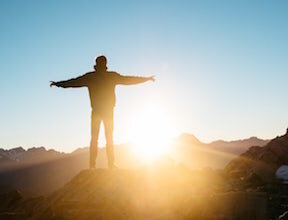
We get nervous about change, then we accept it, then we can’t live without it.
The changes brought about by this latest crisis will, for the time being, be extreme, and they’ll be frightening. People will suffer. Sadly, many will lose friends and loved ones.
But there’s no going back to normal. Natural disasters, wars, and technological advances re-shape our world from one year to the next. Our species and our cultures are forced to adapt to new normals all the time. This time it’s simply accelerated.
We will get through this disaster, too. It will be painful and damn scary, but we will come out the other side. We live, we learn, and we grow.
Don’t expect everything to be “normal.” But, also, don’t expect everything to be for the worst.
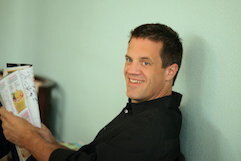
Dom Testa is a broadcaster and author. His series of spy thrillers,
the Eric Swan series
, is available in print, ebook, and audiobook at your favorite retailer.
Face mask pic courtesy of Free To Use Sounds on Unsplash
Handshake courtesy of Cytonn Photography on Unsplash
Interview courtesy of Christina @ wocintechchat.com on Unsplash
Sunrise image courtesy of Pablo Heimplatz on Unsplash
March 29, 2020
How Soap Works
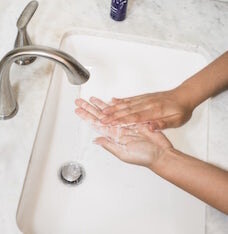
In all my days I’ve never seen anything close to the current flood of public service announcements urging us to “wash our hands with soap.”
It’s as if the stuff was just now brought to Earth by space creatures, and we’re trampling over each other to explore this strange new substance.
Except soap, in various forms, has been with us for thousands of years.
Maybe it’s simply because—although we’ve had it literally at our fingertips our whole lives—we have no idea what it is or how it works.
How about a quick, easy tutorial?
There’s nothing complicated about soap, which partly explains how our ancient ancestors concocted the stuff. The earliest records mentioning it are almost 5,000 years old.
Basically, it’s animal fats (or oils), some ionic salt (or lye), and water.
Yep, combine lye with water, mix in some oils, cook it, then pour it into a mold. You’ll have a bar of soap.
Ah, here’s where most of us misunderstand the function of soap. You see, contrary to popular belief, it doesn’t kill germs.
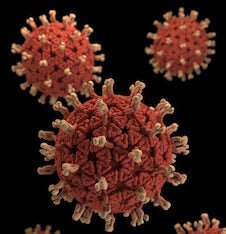
It washes them away.
So, you’re probably wondering, why doesn’t plain H2O do the same? Why not just rinse off and be clean?
Very good question.
Our bodies are covered in bacteria, and some of them are actually good for us.
But the nasty stuff, the germs that cause disease and infection, hitch a ride not on our skin, but within the oils and grease on our skin.
Now, every 7th grade science student learns that oil and water don't mix. They stay as separated as those same 7th grade boys and girls at their first school dance.
Water, by itself, won’t remove grease from your skin.
Think about washing a really greasy pan in the sink. Just plain water doesn’t do squat. The pan stays greasy.
When you put soap on that pan, however . . .
When I was in high school we had the usual cliques. The nerdy types hung out over here, and the party patrol hung out over there.
I didn’t really belong to either group, but I got along well with both. It’s like I was a connector of sorts and could flit back and forth between them.
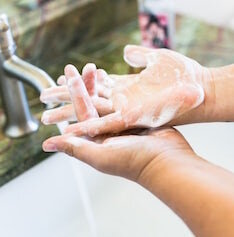
Soap is the same way. It’s the great connector.
Your basic soap molecule has two ends. One end is great at binding with water, while the other end is terrific at binding with oil.
Once you lather up your hands with soap, those molecules grab hold of the germ-laden oils. Then, when you rinse, those same molecules attach themselves to the water.
And, voila! The water, the soap, and the germ-filled oil all rushes down the drain.
Your mom and dad scolded you for not using soap, and I’m willing to bet they had no idea how it worked. They just knew that it did.
Now you know it works, too. But you know why.
Tell your kids. Their hands are filthy. Again.
Soap bubble courtesy of Matthew Tkocz on Unsplash
Hand washing image courtesy of Curology on Unsplash
Germ photo courtesy of CDC on Unsplash
Soapy hands courtesy of Donovan Valdivia on Unsplash
March 28, 2020
From Tragedy to Gratitude
It’s a challenge finding positive stories in the midst of a heartbreaking worldwide crisis. Families everywhere are confronting the worst possible news, wondering how their happiness could be totally upended in a matter of two weeks. Or, in many cases, less.
It’s true that mind-numbing tragedy often brings out the worst in a society. Senseless hoarding by a few at the expense of many who go without. Shocking displays of greed and selfishness. And, sadly, too many insensitive comments, often instigated by ignorance.
Yet, through a cascade of gloomy headlines, glimmers of light have begun to shine through, with a touch of familiarity to restore hope.

From around the globe come tales of communities pausing to acknowledge and applaud the sacrifices made by small groups of dedicated health care professionals.
Doctors, nurses, first responders, and others who truly put themselves on the front lines while risking their lives, are finally being recognized.
On the balconies of high rises in Vancouver, British Columbia, people gather at 7 o’clock each night and applaud, all to show support for hospital teams.
People in Atlanta, Georgia have done the same. So have tens of thousands of people in France, Italy, Denmark, and India.
The royal family — including Prince Charles, who himself had been diagnosed with COVID-19 — joined citizens throughout the U.K. applauding health care workers.
A hashtag, #ClapForDoctors, found traction in countries all over the world.
Then it dawned on me why this sounds familiar.
The outpouring of support is similar to the long-overdue recognition that men and women in the military received following the catastrophe of 9-11.
After years of being ignored or taken for granted, the people responsible for our national defense were at last shown the respect and gratitude they deserved.
It’s happening now with health care professionals who not only are working ridiculously long hours, but are risking their own lives in service to total strangers. It warms my heart to see so many people standing up and applauding these heroes.
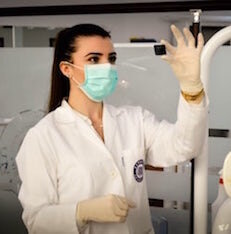
And, just as 9-11 led to a surge in young people joining the military to serve, I can easily envision a new generation eager to embrace a career in health sciences and research.
But the gratitude isn’t limited to just nurses and doctors. Over the past week I’ve watched people acknowledge the patience and hard work put in by others on the battle lines of this pandemic:
Grocery store employees. Department store workers. Delivery people. Pharmacists. Postal employees. Jobs that require up close and personal contact with a populace that’s afraid and not always gracious.
As a nation we’re perhaps finally pulling back from a me-centric way of thinking.
And isn’t it interesting that the people who notably represent the look-at-me way of living — athletes, pop stars, reality-TV faces, and other so-called celebrities — have never seemed so trivial, so unimportant, so unnecessary as they do today, compared to the realities of daily living we now face.
Are we, at last, learning gratitude on a larger scale? Have we been forced by a random twist of biological processes to set aside the frivolous and to focus on what matters most? To focus on the people who matter the most?
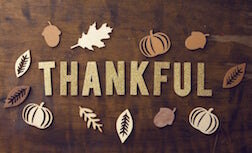
I hope so. In a time when the news is depressing, it’s comforting to know that, while we may have lost our feeling of invulnerability, we haven’t lost the ability to give thanks where due.
In fact, I’m convinced that this year’s Thanksgiving celebration in November will be the most heartfelt holiday in history.
We will have finally realized, on a grand scale, what and who we are most thankful for.
Doctor image courtesy of
Jonathan Borba
on
Unsplash
Lab tech image courtesy of
Ani Kolleshi
on
Unsplash
Thankful image courtesy of
Pro Church Media
on
Unsplash
December 3, 2019
I'm (Reluctantly) Leaving Colorado
“If you don’t do something, this could kill you.”
When a doctor tells you that, you listen. At least you should listen. I was stubborn, so I went to see two other doctors.
All of them agreed: I need to move from Colorado. I have a somewhat-rare condition that prevents me from sleeping more than a few hours each night. In case you hadn’t heard, that’s dangerous.
The best way to treat it? Get away from altitude and move closer to sea level.
So I am. By the time Christmas gets here I’ll be living 1,400 miles from Denver, in a small town in Georgia.
BUT – and this is important – I’m NOT leaving the morning radio show. I’m building a home studio so Jeremy and I can continue to do the show together.
He’ll be in Denver, I’ll be in Georgia, and if I hadn’t told you, you’d never be able to tell. It’ll sound like I’m still in the same room with my radio partner.

Nothing about the show will change. I’ll still do the Mindbender, we’ll still have Boyz Against The Girlz, Rattle Off, Five Calls Says It All, and everything else.
Twenty years ago this would’ve been tricky to do. Today, it’s common in the radio industry. Technology allows us to have listeners all over the world (and we do), and the same basic technology allows me to host the show from anywhere.
I could do it from the International Space Station if they’d let me, and I wish they would. (Although talk about altitude . . .)
This move has been seven years in the making, because that’s how long doctors have asked me to do it. I’ve resisted. But now it’s happening.
No, I won’t become a Falcons/Braves/Hawks fan. I’m a Denver boy, and I’ll come back to town several times a year for Mix 100 events.
Thank you for (hopefully) supporting this move, and for continuing to make our show number one. It has always been, and will always be, a Denver morning show, regardless of where I’m (finally) sleeping.
Thank you.
Dom
July 18, 2019
Sixty Miles

Michael Collins in 1969
It’s about 60 miles from Denver to Colorado Springs. That’s not very far, really. It’s also about 60 miles from Los Angeles to San Bernardino.
Michael Collins made a trip from the Earth to the Moon in 1969, but he never walked on the surface. Instead, he remained 60 miles away.
So why does that 60 miles seem like such a greater distance to me than the jaunt I might make to Colorado Springs?
I’ve spent the week leading up to the momentous 50th anniversary of the Apollo 11 Moon landing wondering how Michael Collins didn’t go crazy.
No, it has nothing to do with his supposed “loneliness” in orbit. Personally, I find that silly and kind of insulting to him. The dude was alone for one day after spending the three previous days crammed into a small spacecraft with two other guys.
I seriously doubt he was lonely; he probably enjoyed the room.
Instead, I’ve always wondered how it felt to make that historic journey and not be allowed to kick up a little lunar dust under your boots. While Neil Armstrong and Buzz Aldrin became the focal points for billions of people, Michael hung out in the command module.
He orbited the Moon 30 times while the other guys made one giant leap. It takes a special person to say, “Yeah, cool. You guys have fun. I’ll wait in the car.”
And it’s not like he was just waiting his turn. In fact, published reports say he would’ve been offered the chance to walk on the lunar surface during another mission, probably Apollo 17.
He turned it down.
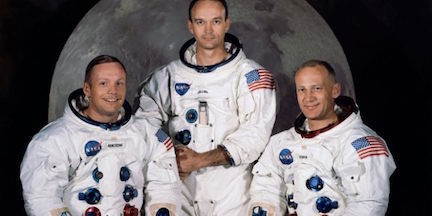
Armstrong, Collins, and Aldrin (L-R)
I was a kid in July of 1969, living in northern Italy, where my dad was stationed with the Air Force. I have faint memories of watching the action on a small black-and-white television before dawn.
So I got to see it, and Michael Collins did not.
Oh, he heard the radio transmission from Neil Armstrong, announcing that the Eagle had landed. But he didn’t get to see the landing or the first step onto the surface.
How fair is it that I, a snot-nosed kid, had a great view of Neil and Buzz making history, and Collins didn’t? Seems wrong.
All these years later I still wonder how it hasn’t eaten away at him. To travel 240,000 miles, only to park it 60 miles from the promised land. Incredible.
Yeah, you say, someone had to be that guy. That’s right. And I would’ve wondered the same thing about anyone else in that particular space suit.
Richard Gordon had the same task with Apollo 12 just four months later.
Ever heard of Stuart Roosa? He orbited alone in February of 1970 while Alan Shepard got famous for hitting golf balls on the lunar surface.
And there were three other guys: Alfred Worden with Apollo 15, Ken Mattingly with Apollo 16, and then Ronald Evans with Apollo 17.
All six of those guys — Collins, Gordon, Roosa, Worden, Mattingly, and Evan — went all that way, trained like crazy, and risked their lives . . . and watched from the balcony.
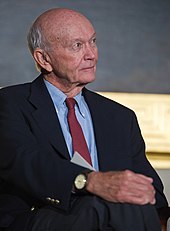
Michael Collins in 2011
On one hand I feel terribly sorry for them. On the other hand, I admire their ability to get that close to a lifelong goal, miss it by that much, and not pout.
So while the world celebrates the 50th anniversary of an incredible triumph of human technological wizardry and remarkable personal bravery, I’ll probably spend a few more minutes contemplating the flights of Michael Collins and the five other guys in the Oh-So-Close Club.
Michael Collins is now 88 years old and still not complaining. I’ll whine for him.
July 6, 2019
Goodbye to Mad Magazine
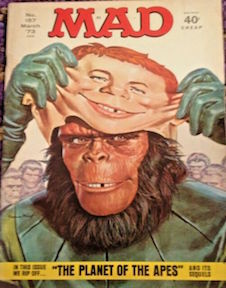
I’m surprised, and yet, really, how could anyone be shocked? How could we expect a traditional publication, one that seemed to cater mostly to 14-year-old boys, still be alive and kicking (and lampooning) in 2020?
The answer is: It won’t be. Mad Magazine, an iconic safe house for smart-asses the world over, will cease publishing new material at the end of 2019.
If you never spent time flipping through its sarcastic, irreverent pages — or if you did but just didn’t get it — that’s fine. My mother and father were dumbfounded that their son, normally a straight-A honor student, would giggle and snort at the most juvenile, ridiculous images.
I think that explains a lot.
I was a good kid, president of the honor society and all that — and yet even goody-two-shoes need a relief valve. Mad Magazine was all that and more. It was snarky and rebellious in a smart way.
And let’s not overlook that. Sure, there were plenty of booger- and fart-laced jokes scattered among the pages. But there were also intelligent, well-targeted pieces of satire in there. Often Mad was how I, as a curious teen, learned about a variety of adult issues, whether it was Watergate, race relations, or activism.
Through its caricatures and slightly-naughty cartoon images I absorbed a completely different education than I got at Jefferson Junior High. And perhaps one that was somehow equally important.
My parents only grudgingly gave me the money to buy a Mad, and even then only a few times a year. I missed out on most of them and had to hope that friends would have them.
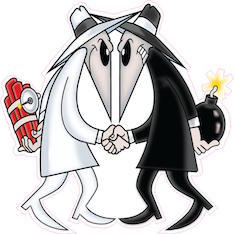
To this day one of my more profound memories is of my friend and neighbor, Ted Woodward, refusing to let me borrow his giant stack of Mad Magazines. He stood right in his doorway with arms crossed and said “No.”
That was 44 years ago and I still feel the burn of shock and anger. Would anyone carry a memory like that about People or Cosmo?
Yeah, it’s 2019 and times have changed. Now it’s not just the kids in the back of the class who act up and inspire the antics of Mad Magazine; it’s everyone, kids and adults alike. Really, are today’s elected officials any more mature than Alfred E. Neuman?
So another anchor point from our past quietly disappears. After nearly 70 years of giving the establishment a popsicle-stained middle finger (even literally, on an infamous 1974 cover) Mad ends its run of new content.
Thank you to the artists and writers who allowed this good kid to be vicariously bad. It was fun.
June 14, 2019
The Middle Dom
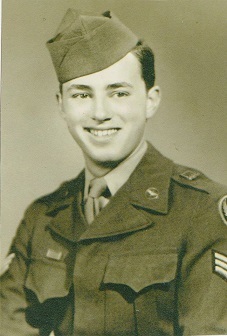
My dad’s name was Dominic, even though he went by Donald throughout his military career. (There was a lot of prejudice against Italians back in his day.)
I’m Dominic, Jr. To honor my father, I named my son Dominic III.
That makes me the middle Dom. And I’m the luckiest of the three.
This Father’s Day weekend I have the chance to reflect on how much better my life is because of my dad and my son.
My dad grew up in a tough neighborhood during tough times, which often leads to a wayward life. But instead of falling down that hole, he became a man of responsibility and discipline.
He married my mom, who was raising four kids on her own, and he became an instant father. He brought order and love – albeit tough love, sometimes – to a somewhat-chaotic situation. And he brought a lot of laughter.
So my sister and I were fortunate. We were born later into a family that had grown together and persevered through some pretty tough times. I, on the other hand, had a great childhood.
From my dad I learned work ethic, how to handle responsibility, and how to laugh my way through life. All three have helped me grow into the man I am.

When I had my son I instantly had to tap into that responsibility. I was young and a bit overwhelmed with fatherhood, but found that I loved it.
It helped that I was blessed with a loving, brilliant, and dynamic young man for a son. His sense of humor is an exact match of the two older Doms. Three peas in a pod.
From D3 I’ve learned to explore outside my comfort zone, a gift I don’t take for granted. He’s kept me young(er), he’s injected enthusiasm and insight into both my radio and writing careers, and by marrying the sweet, charming, and equally snarky Sabra, he brought an incredible daughter-in-law into my life.
I’m the Dom in the middle, the one who’s the luckiest guy ever, bracketed by two people I look up to and revere. On Father’s Day I’ll be thinking about how much I’ve received from both sides: My dad, and my son.
I’ll think about all the laughter that has gone along with all the lessons. I’ll be grateful.
And I’ll be happy.
May 1, 2019
Become a Plumber

This is an excerpt from my book, The Color of Your Dreams , which I wrote to help people who have always wanted to write and publish.The story seems outrageous, but it’s true.DISCLAIMER: This excerpt contains language that some may find offensive. It’s not intended for younger readers, nor anyone who abhors salty words.
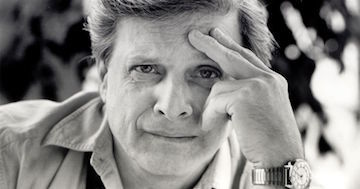
Harlan Ellison
Twenty-something years ago famed writer Harlan Ellison spoke at the University of Denver. A fan of his work, I snagged a ticket, grabbed my worn copy of Shatterday, one of his short story collections, and headed to the auditorium.
Ellison spoke for almost two hours, a presentation packed with insight and valuable information on the business of writing. He regaled the crowd with anecdotes spanning his thirty-odd years of crafting stories.
I, along with everyone else, chuckled at his frequent rants regarding the people who had wronged him over the years. I think we all knew of his reputation for being, shall we say, a bit petulant and more than a little abrasive, but he was on fire that evening.
Imagine my surprise when I soon found myself on the receiving end of his fury.
At the conclusion of his talk, Harlan Ellison sat down to sign books and a huge throng of admirers gathered about. He was personable and chatty as he signed, obviously in a pretty good mood. For him. Until it was my turn at the table.
I was thirty years old, a closet writer, and longed to be published. Here before me was a legend, one who’d inspired me to get serious and to work harder. I was nervous, wondering what to say to this word god. I didn’t want to sound like a fool, but I also didn’t want to waste this one opportunity to connect with him.
He looked up at me, pen poised, awaiting instructions for the inscription, and I blurted out, “Would you please write a word of encouragement for an aspiring writer?”
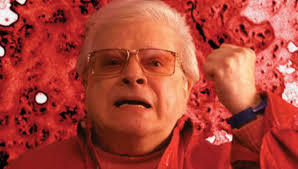
Harlan Ellison
I can’t even describe the look of disgust that broke across his face. He sat back and slammed his pen down on the table. With more than two dozen people crowded around, watching and listening, he stabbed a stubby finger toward my face and went off. Paraphrased, it went along the lines of:
“You wanna be a writer! Everybody wants to be a writer! Everyone who reads a book suddenly thinks they can be a writer! It’s bullshit! If I had a dime for every moron who told me they wanna be a writer. Millions of ‘em! You listen to me, son, if you have any fucking brains at all you’ll give up this bullshit idea and become—I don’t know, a plumber. You know how much money plumbers make? ‘I wanna be a writer.’ Jesus, another one. I can’t believe it.”
He must’ve lectured me for another thirty seconds, spittle shooting from his mouth. All the people standing near the table went completely still and quiet, like a room of Medusa’s victims, afraid he’d next direct his ire upon them.
But no. I was the sole target of Mr. Ellison’s rage.
The tongue-lashing completed, he picked up his pen, opened my copy of Shatterday to the title page, and fulfilled my request for a word of encouragement. He scribbled:
“A word of encouragement: Become a plumber. Harlan Ellison.”
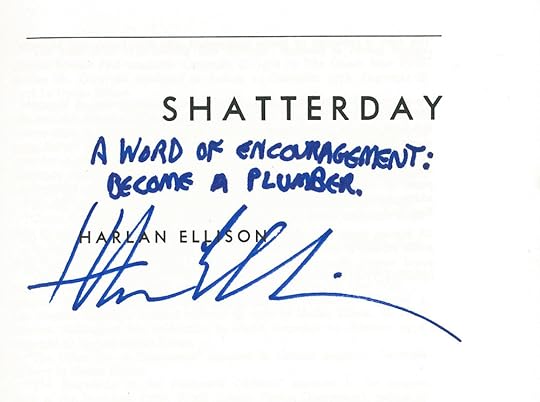
This is a true story. I still have the book on my bookshelf, in a place of honor.
Let’s talk about inspiration here, okay? I have to believe that nine out of ten people would’ve sulked out of that auditorium, gone home, and thrown away every half-finished story they had lying around. Then maybe gone to a bar.
But I laughed. I sincerely thanked him for his time, for his advice, and for his signature. Then I went home, worked late into the night, and banged out at least fifteen-hundred words on a short story. It took me a few years, but eventually I signed a six-book deal with Tor/Forge, and became the published author I’d dreamed of becoming.
Here’s the thing: Harlan Ellison was probably right.
For many people. Just not for me.
There are millions of frustrated authors, and that means millions of kind souls who won’t ever taste the champagne upon signing a book deal. But I never once took his attack personally, and I never once second-guessed my own internal fire.
The way I look at it, Harlan Ellison was just sitting there, waiting for some poor sap to dare ask him for either advice or a pep talk. He was ready, locked and loaded, and I just happened to be the foil. His rant was, in my mind, a shotgun blast, intended for the thirty or more people within earshot. No, it wasn’t aimed at me personally.
It was meant for everybody else. For all the people who say they want to write, but don’t really want to put in the work.
Harlan Ellison never had any intention of inspiring me. He wanted to do the opposite, to save me from a life of hardship if I wasn’t truly invested in writing. You could say he did me a favor. Because, really, if I couldn’t handle the derision from one cranky old shithead, how would I fare when the entire world responded to my art? As someone told me, it was almost like a test. And I passed.
Are you invested? Are you inspired by the writers who move you? Can a cranky old son of a bitch at a writing conference knock you from that path?
Or will every roadblock, every detour, every misstep only fuel your desire that much more? Inspiration is spirit, my friend. I think we’re influenced by spirit, not by some cheesy-ass motivational talk.
Recognize what inspires you. More importantly, do everything you can to be an inspiration to others, not through speeches but through your dedication. When others ask you for advice, be giving. Don’t be a Harlan.
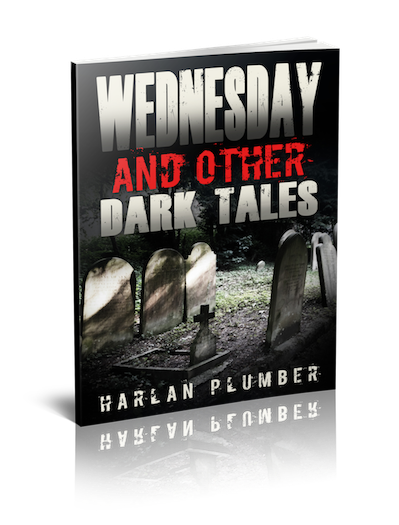
There’s a fun postscript to this story. Not long ago I published a collection of bizarre short fiction I’d hoarded for years. Some of the pieces even dated back to around the time of my encounter with the grump.
When it came time to publish those stories, I chose a new pen name. To honor my landmark moment in the crosshairs of Harlan Ellison, you can find that collection of tales under the name Harlan Plumber.
Hey, he only suggested I become one. He didn’t say how.
February 12, 2019
Don't Renew Your Vows - Rewrite Them
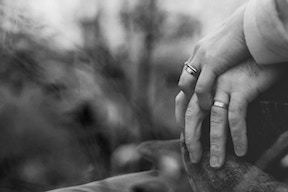
Image courtesy of freestocks.org on Unsplash
An interesting discussion came up on the radio show this past week. A listener had a question about couples renewing their wedding vows, a practice you’ll often see on landmark occasions like a 10th or 20th anniversary.
I gave it some thought during a commercial break and came to the conclusion that people might be looking at this event the wrong way. Sure, you can renew your vows and pledge once again to be faithful and supportive — you know, the usual words spoken millions of times before.
But to me this puts your marriage vows on the same level as your car’s registration, a routine that’s somewhat mechanical, following an established procedure on a predetermined timeline that everyone follows.
After the show I drove home, still pondering the idea. Here’s what I think:
The motivation and the emotion behind renewing your vows is commendable, and actually quite sweet. I just think we’re coming at it the wrong way.
Instead of renewing vows — essentially voicing the same pledges you did five or ten years earlier, using words that every couple exchanges — I think we should use those years of experience with a person to rewrite our vows.
Consider the ten years you’ve spent with someone (or however long). You’ve been down quite a path together, haven’t you? You’ve learned things about each other you couldn’t possibly have known when you said “I do.”
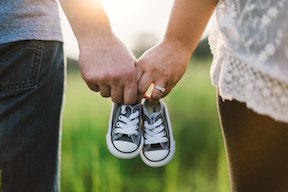
Image courtesy of Drew Hays on Unsplash
You may have had children and learned about each other’s level of patience. You may have purchased a home and discovered a skill set you never knew your mate possessed.
Perhaps you’ve experienced a health scare in your years together, or suffered a death in the family and found a niche of empathy or kindness that had never before surfaced.
Or maybe your travels together have shown you so many things you had in common that weren’t obvious way back when.
On top of these moments of discovery, there’s no doubt you’ve changed as individuals. It’s impossible to think you haven’t. How have those changes impacted your relationship?
There’s so much new material after five or ten years that couldn’t have even been on the table when you originally walked down that aisle. You have a golden opportunity now to use your experiences to craft a new set of vows that don’t rely on some tried-and-true, regurgitated vows that every couple says.
You can take an hour — just one hour — to sit down and write new vows that incorporate what you’ve specifically learned about each other. It could follow a path like this:
“I promise to be more supportive of your efforts to guide our kids into adulthood.”
Or,
“I promise to be more attentive to your needs for alone time, especially after so much family drama has dominated our time as a couple.”
Or,
“I will cherish your quirky morning habits rather than try to change them.”
Touch on things that are specific to the two of you, not something you found in a wedding book. Speak in the language that resonates with you as a couple. Use specific examples if it drives home a point.

Image courtesy of Alvin Mahmudov on Unsplash
It’s a good opportunity to inject some humor into the seriousness of marriage, too. Perhaps “I promise to do a better job of picking up my dirty clothes before you get home so dinner can be peaceful.” No reason to not have a little bit of fun, right?
Most of all, make your new, rewritten vows into a pledge to be a better partner in life. This isn’t a time to request what you want; this is a time to show you’ve paid attention to your partner’s individuality, and to promise you’ll do what you can to honor that uniqueness.
Renewing vows is sweet. Rewriting vows is both productive and deeply meaningful.
And, I think, even sweeter.



